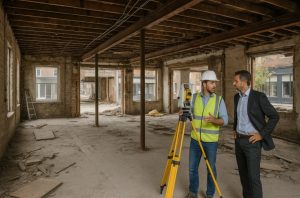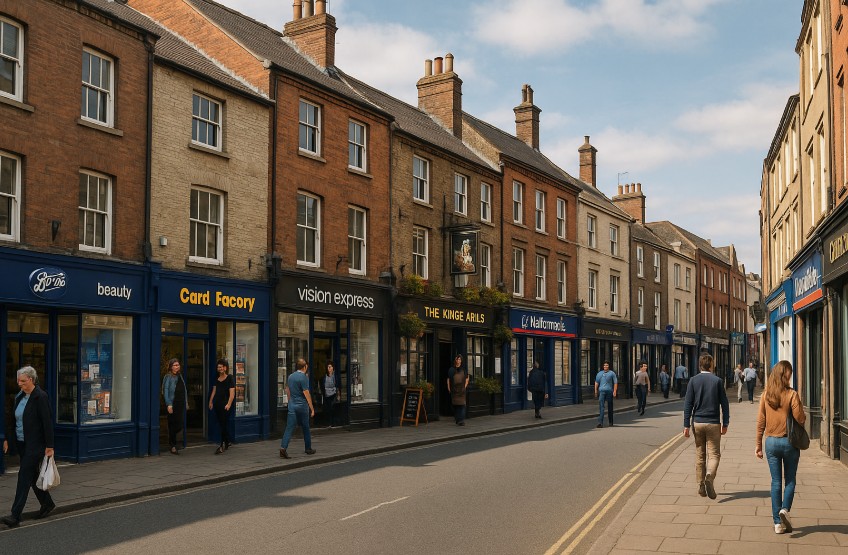Business rates are one of the largest ongoing costs for UK businesses, yet many owners still find them confusing. If you use a property for commercial purposes, you’re likely paying business rates, but do you know how they’re calculated or who sets them? Understanding the process matters because it directly affects your cash flow, your right to appeal, and your eligibility for relief.
The Valuation Office Agency (VOA) is the government body that determines the rateable value of your property, which forms the basis of your business rates bill.
Your local council then uses that value to issue and collect the bill. In this guide, you’ll learn exactly what the VOA does, how business rates are calculated, what reliefs you can access, when to report changes, and how to challenge your valuation. Armed with this knowledge, you can manage your costs and avoid expensive mistakes.
What Is the Valuation Office Agency (VOA) and What Do They Do?

The Valuation Office Agency (VOA) is an executive agency of HM Revenue & Customs (HMRC). It employs over 3,800 staff and provides independent and impartial valuations to support the UK’s tax system and benefits administration.
Key functions of the VOA include:
- Compiling and maintaining Council Tax bands for 26.8 million domestic properties
- Determining the rateable value of over 2.1 million non-domestic (commercial) properties for business rates
- Advising ministers on property valuation and related benefits
- Deciding appeals for the Community Infrastructure Levy
- Determining values for Right to Buy sales in England and Wales
- Rent officers set Local Housing Allowance rates and advise on Housing Benefit subsidy levels
The VOA doesn’t collect your business rates; that’s the job of your local council. However, their property valuations are the foundation of every business rates bill in England and Wales.
As markets change, the VOA conducts regular revaluations to ensure the system remains fair. Their work underpins transparency in property-based taxation, making sure the government has the accurate property data it needs to fund services and deliver benefits effectively.
What Are Business Rates and Who Needs to Pay Them?
Business rates are a tax on non-domestic properties. If you use a building or part of a building for commercial purposes, you’ll probably need to pay them. These funds support local services such as education, emergency response, and infrastructure.
Definition of Business Rates
Business rates are separate from Council Tax. While Council Tax applies to domestic dwellings, business rates apply to properties used for commercial activity. Your bill is based on the property’s rateable value, set by the VOA.
Types of Properties Subject to Business Rates
You must pay business rates if you use:
- Shops
- Offices
- Warehouses
- Factories
- Holiday rentals or guest houses
- Pubs, restaurants, or cafés
- Stables (unless used for farming)
Even mixed-use properties, such as living above your shop, may be liable for both Council Tax and business rates.
Domestic vs Non-domestic Distinction
Domestic properties fall under Council Tax. Non-domestic properties, or any part used for commercial purposes, fall under business rates. For example, a converted garage hair salon in your home would usually attract business rates.
Who is Exempt?
Certain properties are exempt, including:
- Agricultural land and buildings
- Buildings for disabled welfare or training
- Buildings registered for public religious worship
If you’re unsure, the VOA can confirm your property’s status.
How Does the VOA Calculate Rateable Value?
The VOA calculates your property’s rateable value based on how much it would rent for annually on a specific date. For the current rating list, the valuation date is 1 April 2021, effective from 1 April 2023.
Depending on the type of property, the VOA uses different methods:
- Rental comparison: Based on market rents for similar properties nearby
- Receipts and expenditure: Used for pubs, hotels, or leisure facilities
- Contractor’s basis: For properties rarely let out, such as schools or fire stations
The VOA may request rental or lease details to ensure your valuation is accurate. Failure to provide this data can delay your valuation or affect the outcome.
A property’s rateable value reflects its open market rental value under normal conditions, not its income or mortgage status.
If you think your rateable value is wrong, or if details about your property (such as floor area) are inaccurate, you can check and challenge it using your Business Rates Valuation Account online.
How Are Business Rates Calculated by Local Councils?

Once the VOA assigns a rateable value, your local council uses it to calculate your bill. This is done by applying a multiplier and deducting any relief you qualify for.
Use of Multipliers (Standard & Small Business)
There are two multipliers:
- Standard multiplier: For most properties
- Small business multiplier: A lower rate for properties with a rateable value below £51,000
From 1 April 2025 to 31 March 2026, the rates are:
- Standard: 5p
- Small business: 9p
Formula: Rateable value × Multiplier – Any relief
Example: A property with a £20,000 rateable value using the small business multiplier £20,000 × 49.9p = £9,980 before relief.
Who Sends the Bill and When?
Your local council sends the bill between February and March for the tax year starting in April. You can pay in 10 or 12 instalments, or in full.
Always ensure your property details are accurate with both the VOA and your local council to avoid errors.
What Happens During a Revaluation?
A revaluation updates the rateable values of business properties to reflect current market conditions. This keeps the system fair and transparent.
The most recent revaluation took effect on 1 April 2023, based on values from 1 April 2021.
During revaluation:
- All properties are assigned a new rateable value
- The government revises the multipliers
- The VOA may request rental and lease information to ensure accuracy
These revaluations don’t account for your business’s profitability, they focus on market rental data.
Importantly, a rise in your rateable value may not lead to an equal rise in your bill due to transitional relief.
If you believe your valuation is wrong, you can challenge it through your Business Rates Valuation Account.
Can You Appeal or Challenge Your Business Rates?
If you believe your business rates are inaccurate, you can appeal through the VOA’s Check, Challenge, Appeal process:
- Check: Verify your property details (e.g. area, layout, use)
- Challenge: Submit a challenge with evidence
- Appeal: Escalate to the Valuation Tribunal if you disagree with the outcome
Reasons for appeal include:
- Incorrect rateable value
- Inaccurate property details
- Local disruptions (e.g. roadworks, floods) that affect property use
Keep paying your business rates during the appeal. If successful, overpaid amounts will be refunded.
You can manage the process online or appoint an agent registered under VOA agent standards.
What Types of Business Rates Relief Can You Get?

Business rates relief reduces your payable amount.
Available reliefs include:
Small Business Rate Relief
- Properties with rateable value under £15,000
- 100% relief under £12,000, tapering to 0% at £15,000
- Must be your only or main property
Retail, Hospitality & Leisure Relief
- Applies to shops, pubs, restaurants, gyms, hotels
- Up to 40% relief for 2025–26
- Capped at £110,000 per business
Rural Rate Relief
- Applies to businesses in rural areas with fewer than 3,000 people
- Only village pub, shop, or petrol station
- 100% relief available
Transitional and Supporting Small Business Relief
- Helps those losing relief due to revaluation
- Phases increases or caps bill hikes
To apply, contact your local council. Some reliefs are applied automatically, but others require a formal application.
When Do You Need to Report Changes to the VOA?

To avoid incorrect bills, you must report certain property or business changes to the VOA.
These include:
- Expansions, renovations, or demolitions
- Subletting parts of your property
- Changes to property use
- Merging or splitting units
- Moving business location
You can report updates via your Business Rates Valuation Account. The VOA may request documentation such as leases or floorplans.
Failing to report changes could lead to backdated bills or missed relief opportunities.
Do You Need to Pay Business Rates If You Work from Home?
You usually don’t pay business rates if your home-based business:
- Uses a small part of your home (e.g. a spare bedroom)
- Doesn’t have customer visits or employees
- Has no signage or external modifications
However, business rates may apply if:
- You’ve created a separate business area (e.g. a converted garage salon)
- Customers visit regularly
- You’ve made structural changes
- You employ staff who work from the home
These are classed as mixed-use properties and may attract both business rates and Council Tax.
Contact the VOA to confirm your property’s rating.
How Are Business Rates Set for Pubs and Hospitality?
Pubs and licensed premises are valued using Fair Maintainable Turnover (FMT), the annual trade your premises could achieve if run efficiently.
Factors include:
- Type of premises and location
- Trading history and seasonal patterns
- Services provided (food, gaming, events)
- Income from accommodation
- Rents and turnovers of similar premises
A percentage is applied to FMT to determine the rateable value. These percentages are agreed with industry groups like the British Beer and Pub Association.
Pubs may qualify for reliefs such as retail, hospitality, leisure, or rural relief if it’s the only pub in the area.
How Are Holiday Lets and Self-Catering Properties Assessed?

Holiday lets may fall under business rates instead of council tax.
Criteria for Business Rates vs Council Tax
| Location | Nights Available | Nights Let | Future Availability |
|---|---|---|---|
| England | 140 | 70 | 140 |
| Wales | 252 | 182 | 252 |
If your property qualifies, inform the VOA using the correct form. If your rateable value is under £15,000, you may also qualify for Small Business Rate Relief.
Failing to report correct use could mean you’re billed incorrectly or miss out on relief.
What Should You Do About Your Business Rates?
Managing your business rates requires action:
- Check your rateable value online
- Keep property details updated
- Challenge valuations if needed
- Apply for reliefs promptly
- Report changes to avoid backdated bills
Professional agents can help, but many tasks can be done online. Staying proactive protects your business and can save you money.
Business Rates Relief Options at a Glance
| Relief Type | Who Qualifies | Relief Amount | Where to Apply |
|---|---|---|---|
| Small Business Rate Relief | Rateable value below £15,000 | Up to 100% | Local Council |
| Retail, Hospitality, Leisure | Shops, pubs, restaurants, hotels, cinemas | 40% (capped at £110,000) | Local Council |
| Rural Rate Relief | Only village business under 3,000 people | 100% | Local Council |
| Transitional Relief | Significant increase after revaluation | Phased increases | Automatic/Local |
| Supporting Small Business | After loss of full SBR | Annual increase capped | Automatic/Local |
This table summarises the main reliefs that most UK businesses can access. Check with your council for updates.
Conclusion
Business rates are a major expense, but understanding how they’re calculated, what reliefs you qualify for, and when to report changes can save your business money.
The VOA’s valuations underpin the entire system, while local councils handle billing and collections.
Knowing your rights and obligations means fewer surprises and more control over your budget. With revaluations every few years, staying proactive about your property’s rateable value is essential.
This guide equips you to manage your business rates more effectively, whether you’re running a small shop, a pub, or holiday accommodation.
FAQs
What is the difference between VOA and the local council?
The VOA sets your property’s rateable value, and your local council uses it to calculate and collect your bill.
Can you challenge business rates yourself?
Yes, through your Business Rates Valuation Account online.
When do business rates bills arrive?
Usually in February or March for the tax year starting in April.
What does ‘rateable value’ mean?
It’s the estimated annual rental value of your property on a specific date.
Who doesn’t have to pay business rates?
Properties like agricultural land or religious buildings are usually exempt.
Do home-based businesses pay business rates?
Only if a significant portion of the home is used commercially.
How often does VOA revalue properties?
Typically every 3–5 years the last revaluation was in 2023.

Leave a Reply